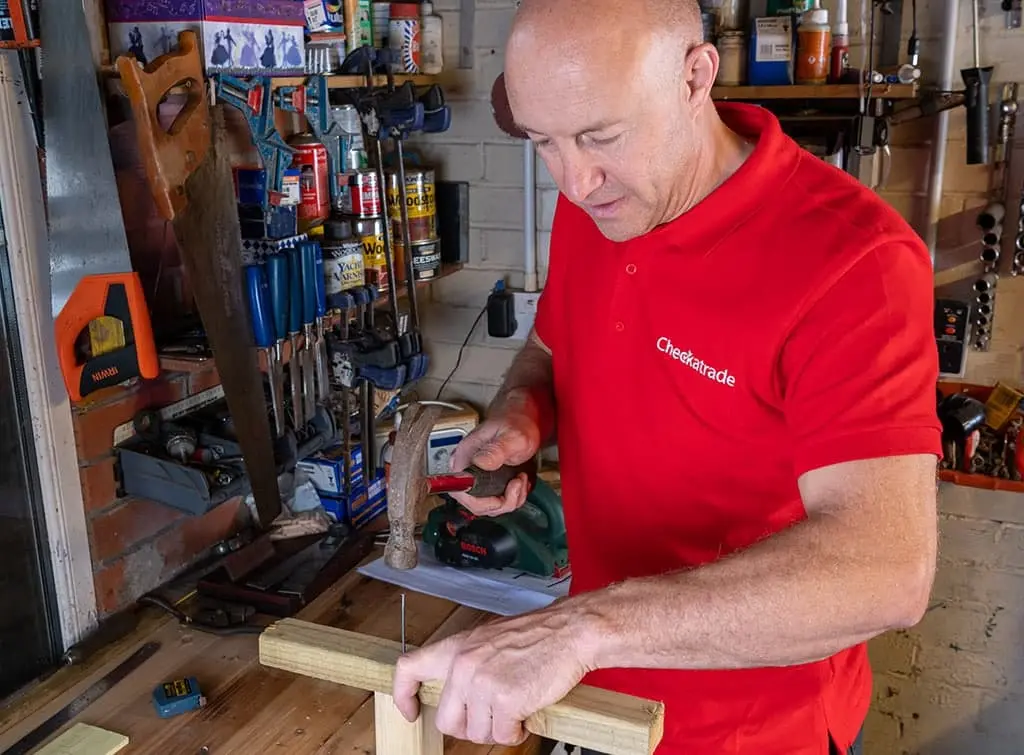Blog>Trade>Growing your trade business>How much do joiners earn?
Last updated: 19 December 2024
How much do joiners earn?
Joinery is a rewarding trade to get into and often in high demand. But how much do joiners earn in the UK? Here's what you need to know about a joiner salary.

If you’re a dab hand at working with timber, joinery could be an ideal trade for you. As an artisan responsible for designing, creating and installing things made of wood, every day could be different. You’ll be able to take real pride in your work. But how much do joiners earn?
Whether you’re new to the trade, looking to go self-employed or hoping to hire employees for your joinery business, this guide is for you.
What's an average joiner salary?
A joiner can start out earning £13,258 per year as an apprentice on becoming a joiner. The average joiner wage could climb to £66,377 per year for a limited company owner.
Exactly how much you can expect to earn will depend on several factors. This includes your location, any areas of specialty, your rates and how many jobs you complete each year.
| Level | Per hour | Per day | Per year | Business Costs* | Approximate Take Home Pay |
|---|---|---|---|---|---|
| Apprentice | £7.55 | £60.40 | £13,258 | 0 | £12,509 |
| Newly Qualified | £12.21 | £97.68 | £21,441 | 0 | £18,073 |
| Employed | £17 | £136 | £35,360 | 0 | £27,538 |
| Sole Trader | £37.50 | £300 | £55,314 | £6,914 | £37,010 |
| Business Owner (ltd company) | £45 | £360 | £66,377 | £11,616 | £43,268 |
| *includes estimated costs for business expenses such as vehicle, tools, insurance, fuel etc | |||||
| Last updated: November 2024 Our costs are ballpark averages - get a local tradesperson to quote now | |||||
As you can see, there’s good scope to improve your earnings as you become more experienced. Perhaps unsurprisingly, a joiner salary is higher by going self-employed. That could be as a sole trader or a limited company.
Find leads for your joinery business
Checkatrade can help you get your business off the ground

How much do joiners earn as employees?
Working for a company as a joiner is a great way to build up your experience and learn the tricks of the trade. However, the highest earning potential is reserved for joiners who are self-employed.
How much do apprentice joiners earn?
A joiner’s apprentice will earn an average salary of £13,258 per year (£12,509 take home). That works out at around £1308.57 per month or £7.55 per hour.
That might not sound like a lot, but it’s a fantastic way to learn on the job. It shouldn’t take long until you’re fully qualified, at which point there’s plenty of scope to work your way up and earn more.
What's the average joiner wage per year?
Once you’ve qualified as a joiner, you’ll earn a salary that reflects your level of experience, where you live and any special skills you have. Here’s an idea of the average salary of a joiner and how much you can expect to make per year.
Newly qualified joiner: £21,441 per year (£18,073 take home)
Employed joiner: £35,360 per year (£27,538 take home)
How much do joiners earn a month?
If you’re wondering how much joiners earn a month, you’re in luck. We’ve broken down the average yearly salary above to reveal how much you could expect to earn monthly.
Newly qualified joiner: £2116.24 per month
Employed joiner: £2946.44 per month
Average joiner salary in the UK per hour
So, how much do employed joiners earn per hour? Here’s the lowdown based on the yearly salary provided above.
Newly qualified: £12.21 per hour
Employed joiner: £17 per hour
Although being an employed joiner can be a good experience and means less risk on your part, you’ll have the potential to earn a lot more if you go self-employed.
Find leads for your joinery business
Checkatrade can help you get your business off the ground

How much do self-employed joiners earn?
As a self-employed joiner, you’ll be able to set your own rates. You’ll also be able to pocket more of what you charge clients! So, it’s no surprise that this comes with the highest average salary for a joiner.
If you’re interested in increasing your earning potential you could think about starting your own business.You'll also need to get to grips with differences between sole trader and limited company.
How to start a joinery business
Whether you’re hanging doors, building kitchen units, or fitting out a shop, joiners are always in demand. It’s certainly one of the most interesting trades, with no two projects ever being the same. And the industry has only been growing in recent years. Why start a joinery business? There’s no
How much does a self-employed joiner earn per hour?
Self-employed joiners can run their own businesses usually as sole traders or limited companies.
Sole trader: £37.50 per hour
Limited company owner: £45 per hour
As you can see, if you decide to run your own limited company, you’ll have the potential to earn the most. However, you’ll also have more admin and business expenses to contend with!
What's a self-employed joiner day rate?
Some joiners prefer to charge on a day rate. The average joiner salary based on working an eight-hour day is:
Sole trader: £300 per day
Limited company owner: £360 per day
Find leads for your joinery business
Checkatrade can help you get your business off the ground
Joinery business revenue
So, how does that compare when you look at these earnings across a whole year?
Sole trader: £55,314 per year (£37,010 take home)
Limited company owner: £66,377 per year (£43,268 take home)
Business expenses
When you’re working out your take-home pay as a self-employed joiner, you’ll have to take into account your outgoings. These include things like:
Tools
Insurance
Vehicles and fuel
We’ve deducted some estimated costs here, but you might have other business expenses that you choose to invest in to run your business.
These are the average business costs for running your own business:
Sole trader: £6,914 per year
Limited company owner: £11,616 per year
Remember, though, that you can use allowable business expenses to reduce your taxable business profits.
A trade's guide to business expenses
Business expenses are a necessity for tradespeople. Managing them effectively helps to maximise your profits. This is not just a question of keeping business expenses as low as you can. Many business expenses are tax deductible. That means you can use them to reduce your profits. It’s little
Set your hours and pay by starting your own joinery business
If you like the idea of maximising your earning potential, you may want to set up your own joinery business. Better still, it will also enable you to choose your own hours, set your own rates and control how many jobs you win each year. Nice!
To learn everything you need to know about setting up your own joinery business, make sure to sign up to our ‘Become the Boss’ series.
https://www.youtube.com/watch?v=UoRV0Fsrgnk
We’ll send you seven emails (and a cheeky bonus one!) featuring handy tips and guidance from tradespeople who were once in your position. Plus, you’ll receive a free business strategy call.
And at the end of it all? You’ll get to be your own boss!
To get started, just enter your email in the form below (then, enjoy receiving trade business insider secrets straight to your pocket!).
How to boost your joinery business profit
It might feel like a long way off now, but before you know it, you’ll be looking at growing your joinery business. You'll be keen to boost that all-important profit! There are lots of ways you can set yourself up for success, including our free guide to growing your trade business.
How to grow your trade business in [year] - Free guide included
4 ways to grow your trade business Are you looking at how you can take your business to the next level? We've created a no-nonsense guide with the tips you need to grow your trade business. The guide will help you: Understand why online marketing is essential, and what options you have See why old
Pinpoint your USP
To encourage homeowners to choose you over your competitors, it helps to have a USP. That's your unique selling point - what distinguishes you from competitors.
This can include:
What services you offer
Whether you specialise in certain types of joinery
What makes your business stand out from the crowd
Offering a combination of joinery and carpenter services
Get more leads
To boost your bottom line, you’ll need a steady stream of leads. That’s where marketing comes in.
Think about:
Find leads for your joinery business
Checkatrade can help you get your business off the ground
Win more jobs
Increasing your leads is only half the picture – you’ll also need to be able to convert those leads into paying customers!
Trust is an essential part of this. So, make sure you collect reviews from happy customers. You can display these on your website as well as asking customers to review you on third-party sites such as Google or trade directories.
Becoming a Checkatrade member is another fantastic way to give homeowners confidence in your business.

Consider your rates
Running your own business will mean you can choose your own rates. But you’ll need to make sure you price yourself sensibly.
A few pointers here include:
Don't charge too much or you could lose out to competitors
Don't charge too little or you could struggle to make a profit
Research the joiner business market to learn about the going rate for work
Look at your cash flow, budgeting and variable costs to decide how much to charge
Reduce your expenditure
Improving your profit margins isn’t just about boosting your revenue. Other factors include:
Reducing your expenditure to keep more revenue in your pocket.
Limiting your debt and credit card bills
Shopping around for the best deals on good-quality tools, materials and workwear. As a Checkatrade member, you’ll be able to access exclusive benefits and discounts with our trade partners.
Decide where you want to work
Consider how far you’re willing to travel to carry out joinery work. The further you travel for a job, the greater your costs are likely to be.
So, it might be worth staying closer to home to keep your costs down. You can also be more fuel efficient with your vehicles.
That said, there are things you can do to make it worth your while travelling further afield. For instance, you could charge a travel fee for more distant jobs.

Why join Checkatrade as a joiner?
If earning a joiner salary being your own boss is enticing, knowing where to find business support is handy.
One way is by finding more sales leads. Checkatrade members receive our help with new enquiries. There are lots of other benefits of Checkatrade membership too.
They include:
Exclusive offers and discounts with suppliers like Tradepoint and Wickes
Reduced cost of workwear and branding
Guaranteed work when booked through us (T&Cs apply)
Dedicated trades apps for job management and quoting/invoicing
What do you need to become Checkatrade approved?
Becoming a Checkatrade member comes with a whole host of benefits, but the biggest has to be gaining our seal of approval. Homeowners tend to expect a commitment to quality when it comes to the Checkatrade tick, which can help you to win more business. Here are the checks you'll need to pass to join our directory.
FAQs
What jobs can a joiner do?
A joiner is a skilled tradesperson who specialises in making items out of wood. Typically, this can include doors, window frames, floors and staircases.
What is a carpenter top salary?
Bear in mind, that carpenters and joiners have different trade skills. Joiners focus on constructing items from wood, such as doors and window frames. Carpenters generally take items made by joiners and install them, usually on construction sites. A carpenter top salary can be quite high.
What do joiners charge per hour?
A joiners’ charge per hour varies according to their experience and qualifications. The answer to the question how much do apprentice joiners earn per hour is £7.55. At the higher end of the scale, a joiner who owns a limited company can earn £45 per hour.
What is the average hourly rate for a joiner in Scotland?
Our guide to a joiner salary is based on the average for the UK. This includes the average hourly rate for a joiner in Scotland.
What is a carpenter salary in London?
Like a joiner salary, a carpenter salary in London is likely to be higher than elsewhere in the UK. That’s mainly because the cost of living is higher in the capital. Salaries in London for many trades usually include what’s called a London weighting.
Run your joinery business more efficiently
Checkatrade members enjoy exclusive discounts and offers






